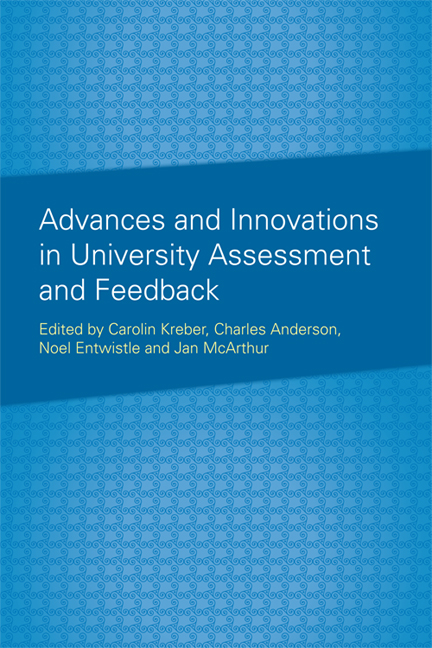Book contents
- Frontmatter
- Contents
- List of Tables and Figures
- Acknowledgements
- Foreword
- Introduction
- Part A Changing Perspectives on the Nature and Purposes of Assessment
- 1 Shifting Views of Assessment: From Secret Teachers' Business to Sustaining Learning
- 2 Flourishing amid Strangeness and Uncertainty: Exploring the Meaning of ‘Graduateness’ and its Challenges for Assessment
- 3 Assessment for Learning Environments: A Student-Centred Perspective
- Part B Students' Perceptions of Assessment and Feedback
- Part C Reconceptualising Important Facets of Assessment
- Part D Innovations in Assessment Practices
- Notes on the Contributors
- Index
2 - Flourishing amid Strangeness and Uncertainty: Exploring the Meaning of ‘Graduateness’ and its Challenges for Assessment
from Part A - Changing Perspectives on the Nature and Purposes of Assessment
Published online by Cambridge University Press: 05 August 2016
- Frontmatter
- Contents
- List of Tables and Figures
- Acknowledgements
- Foreword
- Introduction
- Part A Changing Perspectives on the Nature and Purposes of Assessment
- 1 Shifting Views of Assessment: From Secret Teachers' Business to Sustaining Learning
- 2 Flourishing amid Strangeness and Uncertainty: Exploring the Meaning of ‘Graduateness’ and its Challenges for Assessment
- 3 Assessment for Learning Environments: A Student-Centred Perspective
- Part B Students' Perceptions of Assessment and Feedback
- Part C Reconceptualising Important Facets of Assessment
- Part D Innovations in Assessment Practices
- Notes on the Contributors
- Index
Summary
Introduction
During his tenure as Vice-Principal for Academic Enhancement at The University of Edinburgh, Professor Hounsell took leadership of the sector's engagement with the Scottish enhancement theme ‘Graduates for the 21st Century’ (QAA Scotland 2008–2011), thereby contributing to a deeper understanding of the meaning of ‘graduateness’ and the related notion of graduate attributes (Hounsell 2011a, 2011b). Determining the nature of ‘graduateness’ requires us to stand back and ask: what ought to be the educational purposes of universities at this time? And, more specifically: does the world we live in today render these purposes markedly different to, or perhaps broader than, those of earlier times?
In recent years these questions have been widely debated and many universities have begun to draw up statements of so-called ‘generic graduate attributes’ that stand for the key skills, abilities and dispositions students are expected to attain over the course of their university study. While often inspired by the employability agenda, a broader sense of the educational purposes of higher education is, at times, acknowledged in the literature on graduate attributes. For example, Bowden et al. (2000) defined ‘graduate attributes’ as:
the qualities, skills and understandings a university community agrees its students should develop during their time with the institution. These attributes include but go beyond the disciplinary expertise or technical knowledge that has traditionally formed the core of most university courses. They are qualities that also prepare graduates as agents of social good in an unknown future. (Cited in Hounsell 2011b)
Although there is variation among the graduate attribute statements drawn up by different institutions, there also tends to be agreement on some core or ‘enabling’ attributes (Barrie 2004). These include, for example, being capable of continuing learning in a world that is uncertain (see also Boud in this volume), having an inquiry–orientation and being capable of contributing effectively to civic life in a global context (see Hughes and Barrie 2010).
In this chapter, I undertake an inquiry into the nature of ‘graduateness’ that is inspired by philosophical accounts of the notion of ‘authenticity’. The intent is to offer a theory-based – specifically, a philosophically-based – rationale for the singling out of certain core attributes as critical today and offer an outline of the conditions that assessment practices would need to meet in order to promote these attributes.
- Type
- Chapter
- Information
- Publisher: Edinburgh University PressPrint publication year: 2014



